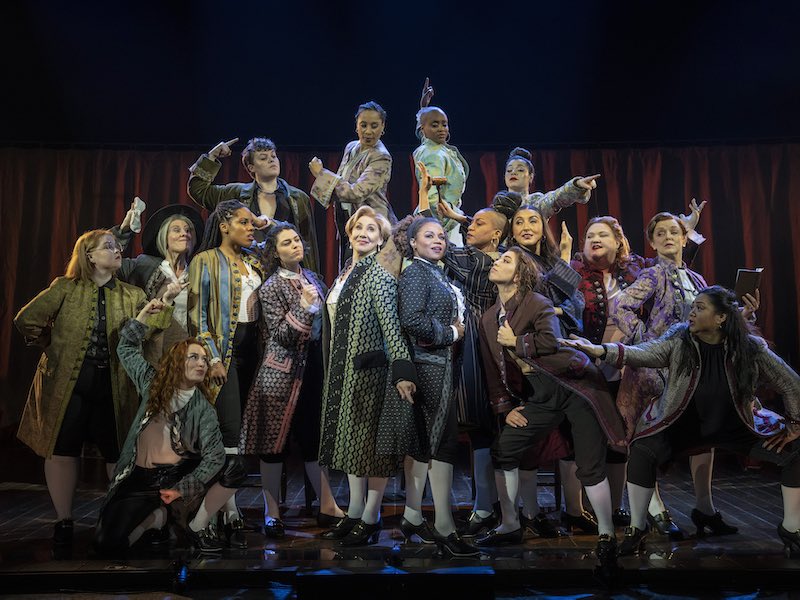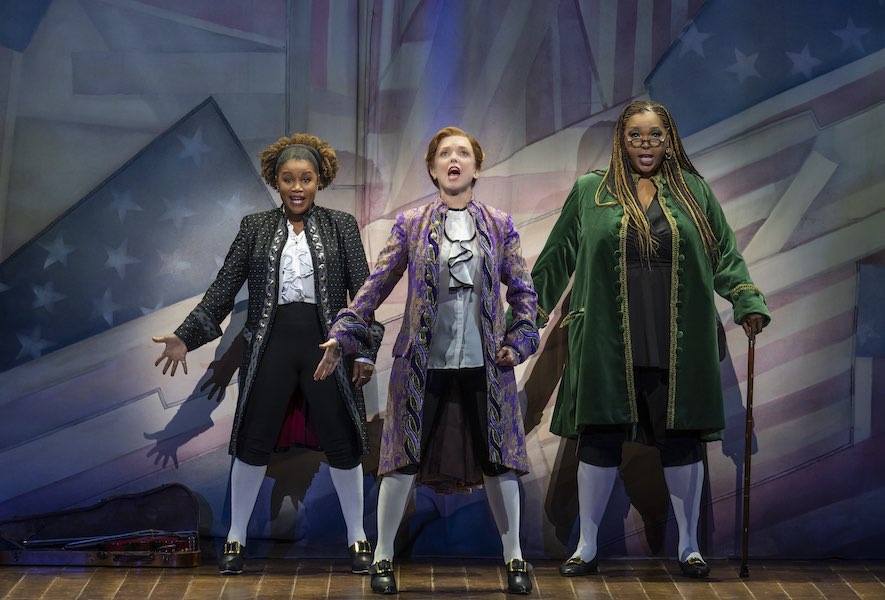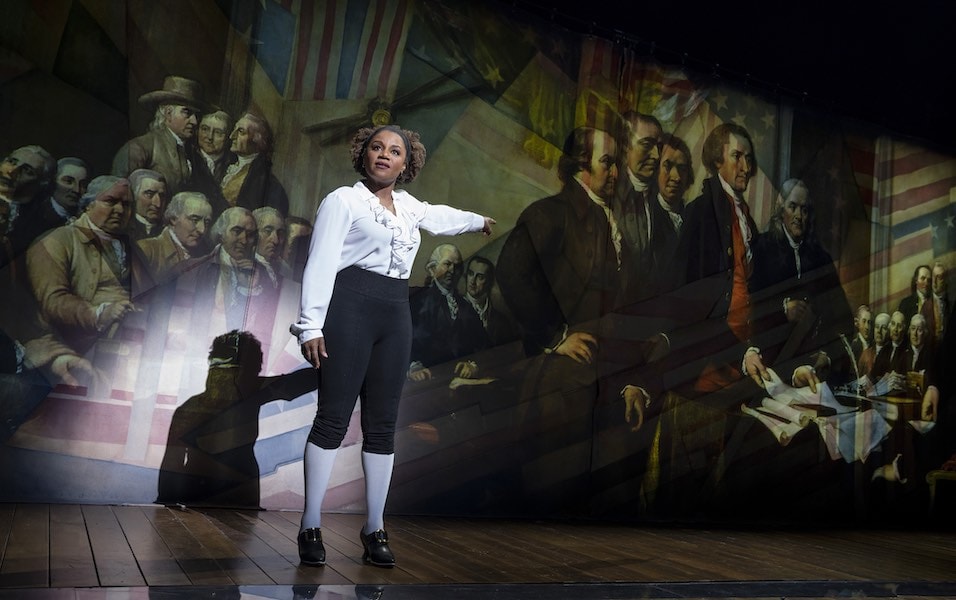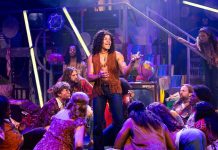As an exercise in congressional sausage-making, the enduring musical 1776 has few peers. It’s a witty take on the sinuous maneuvering, outright bullying, and hard-fought dealmaking that, miraculously, birthed the Declaration of Independence during a sweat-drenched summer in Philadelphia.
Premiering in 1969, the show, with music and lyrics by Sherman Edwards and book by Peter Stone, chalked up 1,200 performances on Broadway. It was made into a film in 1972 and then successfully restaged in 1997.
In the post-Hamilton world of theatrical and historical reimagining, what more can be wrenched from this oft-told tale? The 2022 version directed by Jeffrey L. Page and Diane Paulus, now playing at the Kennedy Center, flips the Founding Fathers. The sausage is filled entirely by a racially diverse cast who identify as female, trans, non-binary, or gender non-conforming.

The casting concept gets off to a quick and effective start as John Adams strides across the stage, cocks a critical eye on a scrim picturing the Declaration’s old, white, male signers, and lets out a disdainful hmmpf. The cast members assemble on the stage, clamber into buckled shoes, roll their white socks up to their knees, and don floppy frock coats. Voilà — there we are, back in the 18th century.
The Second Continental Congress is drowning in lethargy. While they half-heartedly debate piddling policies, the existential issue of independence lies dormant in the room — more than a year after Lexington and Concord. Only the unlikable Adams, played with fulminating energy by Gisela Adisa, seeks to rouse them. Weary of his bombast, however, his fellow delegates answer Adams with the withering “Sit Down, John.”
The wily Benjamin Franklin — wonderfully played by Liz Mikel — counsels John to get off his soapbox, work behind the scenes, and let others advance his agenda. An epic and messy battle of will, self-interest, courage, and cowardice erupts in the ensuing weeks.
Richard Henry Lee, played with comic zest by Shawna Hamic, is enlisted to move independence forward, a task he accepts with relish, motivated, perhaps, less by a burning yen for liberty than by an inflated sense of self-worth. In the hilarious “The Lees of Old Virginia,” he struts his family’s bona fides. The arch-royalist John Dickinson of Pennsylvania (Joanna Glushak) cautions members to watch out for their own business interests. A dreamy Thomas Jefferson (Nancy Anderson) sits off in a corner and reads right through the endless debates. He plays his violin and pines for his wife until pressed into authorship by Adams and Franklin. When he finally finishes the first draft and the president of the Congress, John Hancock (Oneika Phillips), calls for comments, nearly every hand shoots up.

Ultimately it is slick and venal Edward Rutledge of South Carolina (Kassandra Haddock) who exacts the biggest toll on the draft declaration. Jefferson’s anti-slavery language must be excised before the Southern states will vote yea. When the bloviating Adams objects, Rutledge launches into “Molasses to Rum,” a vicious condemnation of northern hypocrisy.
Only rarely do we glimpse the effects of life outside the sweltering confines of Independence Hall. John Adams corresponds warmly with his wife, Abigail (Brooke Simpson), who suffers from his absence. Jefferson’s writer’s block is largely remedied when Adams arranges for Jefferson’s wife Martha (Connor Lyon) to make a conjugal visit to her husband, a rom-com moment celebrated in “He Plays the Violin.” In “Momma, Look Sharp,” the Courier (Candice Marie Woods) and Andrew McNair, the Congressional Custodian (Tiffani Barbour), remind us that while these politicians are dithering in a room, there is a real war going on and people are dying.

Talented as they are, the cast is not always optimally supported by the production’s staging. The sound (Jonathan Deans) is so dense and loud that many of the lyrics verge on being indecipherable. Jen Schriever’s lighting sometimes over-dramatizes a story that is already larger than life. While Emilio Sosa’s lush costumes flesh out the vivid characters, Scott Pask’s set design seems unnecessarily stark and cheesy. Granted, these founding folks were not deliberating at the Ritz, but the battered chairs and faded backdrops give Eisenhower Theater audiences less to look at than they might like.
The deeper we get into the show, the less it seems to matter whether we are seeing men or women players in any of the roles. They are simply people — some brilliant, some corrupt, and others not quite up to the task of nation-building. If the goal of this production is to assert a feminist viewpoint with a cast playing against type, the point is largely lost as we become increasingly caught up in a messy, meat-grinding drama whose outcome we all know well. Yet the fact that they aren’t men reminds us that life, liberty, and the pursuit of happiness are the inalienable rights of all people, regardless of gender.
Running Time: Two hours and 45 minutes with a 15-minute intermission.
1776 plays through July 16, 2023, in the Eisenhower Theater at the Kennedy Center, 2700 F Street NW, Washington, DC. Tickets ($45–$155) are available at the box office, online, or by calling (202) 467-4600 or (800) 444-1324.
The program for 1776 is online here.
COVID Safety: Masks are optional in all Kennedy Center spaces for visitors and staff. If you prefer to wear a mask, you are welcome to do so. See Kennedy Center’s complete COVID Safety Plan here.




